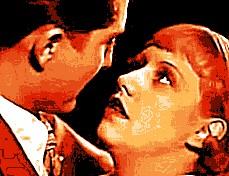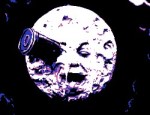Film Review
The burgeoning popularity of the stage operetta in the early 1930s provided
a massive boost to the film industry on both sides of the Atlantic as it
made the transition to sound cinema. Filmmakers were not slow to take
advantage of the introduction of synchronised sound to tap into the huge
public demand for the kind of frivolous light entertainment that offered
a welcome escape from the grim realities of the Depression era. In
France, operetta stars such as Henri Garat and Jean Gabin made their entry
into cinema on the back of this craze, through such films as Louis Mercanton's
Il est charmant (1932) and
René Pujol's
Chacun sa chance
(1931) - as did many others whose names are now lost in the mists of time,
notably Jacqueline Francell. Francell's screen debut opposite Raimu
in Marc Allégret's romantic comedy
La Petite chocolatière
(1932) was followed by
Mirages de Paris, a feisty musical comedy that
made good use of her talent as a dancer and singer, although her screen career
did not extend beyond the 1930s (apart from her contribution as narrator
to Sacha Guitry's controversial 1944 documentary
De Jeanne d'Arc à
Philippe Pétain).
Mirages de Paris was a surprising departure for its director, Fyodor
Otsep, who had started out as a screenwriter in his native Russia (collaborating
with the great Yakov Protazanov on
The Queen of Spades (1916) and
Aelita (1924)) before making a name for himself as a director with
Der Mörder Dimitri
Karamasoff (1931), arguably the best screen adaptation of Fyodor
Dostoevsky's classic Russian novel
The Brothers Karamazov. Otsep
also made a French version of the novel,
Les Frères Karamazov
(1931), and this film's popularity in France earned him an invitation to
work at the prestigious Paris-based company Pathé-Natan to direct
even more ambitious films.
Mirages de Paris was the first of
five films that Otsep made in France before he was lured to Hollywood at
the onset of WWII. (His American career was cut short by his premature
death in 1949.) An exuberant comedy of the kind that French cinema
audiences most craved at the time,
Mirages de Paris feels somewhat
out of place in Otsep's mostly sombre oeuvre but the director brings to it
the same bold imaginative flair and commitment that would benefit his subsequent,
far more serious offerings for Pathé-Natan -
Amok (1934) and
La Dame de pique (1937).
Fyodor Otsep's zany penchant for visual metaphor - one of the defining motifs
of early Soviet era cinema - is apparent throughout
Mirages de Paris and
is used to devastatingly funny effect in some places. Most memorable
is the scene in which the heroine Madeleine and her beau François
become intensely amorous in the latter's garret apartment. Their inflamed
passion is implied by cutaway shots of a kettle coming to the boil and the
lid suddenly flying up into the air - just before François's present
sweetheart - Juliette - shows up unexpectedly. François's dampened
ardour is cheekily suggested by a surreal shot of the kettle lid jumping
into the air of its own accord and fitting itself snugly on the kettle.
At the start of the film, the tyrannical nature of the fearful directrix
of Madeleine's boarding school is made apparent as she scours the school
grounds for the missing student. So intimidating is this fiend in petticoats
that the garden's proudly erect Phallic fountains are reduced to a limp timid
trickle in her presence!
Sophisticated montage techniques - which Otsep's contemporary Sergei Eisenstein
had used to great dramatic effect in his films - are likewise marshalled
for comic effect, with inter-cutting between the plot-strands seamlessly
achieved by a careful alignment of virtually identical shots. Accelerated
montage brings a wildly anarchic feel to the dizzying sequence in which Madeleine
gets caught up in a raid on a jewellery shop - the result resembling a mad
full-on collision between the worlds of Eisenstein and Mack Sennett.
Camera motion - a comparative rarity in a sound film of this era - is also
used to great effect, the most striking example being a long tracking shot
that follows the heroine as she leaves the theatre and finds herself alone
and dejected in the unwelcoming streets of the city where she had hoped to
find fame and fortune. This sequence has more than a touch of Chaplinesque
poignancy about it. Otsep's immense visual flair helps to keep the
gags coming, building to a crescendo with the outrageous finale in which
a popular opera singer is humiliated by the mob and ends up running on a
revolving stage in a delirious comedy punchline worthy of the great silent
comedians of the previous decades.
Mirage de Paris's bountiful mélange of slapstick and musical
numbers would certainly have made it a hit with the cinema-going public of
its day, but what makes it particularly worthy of interest today is its acerbic
commentary on the entertainment industry of its time. It seems that
the celebrity culture and delusions of instant fame are not recent phenomena
- these were just as widespread among the populace even in the early 1930s!
Without the full force of the publicity machine behind you it seems you can't
get anywhere - talent alone is no guarantee of success. So says the
seediest character in the film - an unscrupulous promoter who preys on starry-eyed
wannabes, offering them support only if they are already rich enough to pay
for it. Madeleine's obsessive pursuit of stardom sends her on a fraught
Alice in Wonderland-style adventure that brings her success through
pure happenstance. Mistaking a lowly support artiste (Roger Tréville)
for a great opera singer (Marcel Vallée) she is soon caught up in
a tangled web of misunderstandings, including her own supposed suicide!
The mob come to her rescue and it all ends as any fairytale should - with
our heroine getting both love and fame, just as the cinema-going public demand.
The sheer absurdity of the plot as it gallops from one improbable situation
to another reaches Ionesco proportions on occasions, yet the satire is as
sharp and mercilessly cutting as the blade on the most scrupulously maintained
guillotine.
Mirages de Paris is a comedy delight - not just
one of the most entertaining films of its kind in French cinema of the 1930s,
but also one of the most brazenly witty and involving. It would be
some years yet before Hollywood would turn the camera on itself and offer
a satire of comparable mischief and astuteness.
© James Travers 2023
The above content is owned by frenchfilms.org and must not be copied.
Film Synopsis
Convinced that she has what it takes to become a great star
of the stage Madeleine Duchanel runs away from her strictly run provincial
boarding school and heads for the bright lights of Paris. It doesn't
take long for her to discover that there is far more to stardom than talent.
Without publicity she hasn't a hope, a dodgy theatrical agent assures her
having demanded a small fortune for his services. Lacking the money
even to pay for one night's accommodation in the big city, Madeleine is left
downhearted but still hopeful that something may turn up. And so it
does - in the form of a handsome young theatrical named François.
Mistaking this unknown performer for the great opera singer Tonnerre, a man
he scarcely resembles, Madeleine wheedles her way into his affections, but
a promising romance is suddenly nipped in the bud by the unexpected appearance
of François's present sweetheart, Juliette. The latter's jealousy
results in a chaotic scene when François returns to the opera house
and fails to make it onto the stage in time for the climax of an opera in
which Tonnerre is the main attraction. Leaving the theatre, François
runs into Madeleine a second time and invites her back to his garret apartment
overlooking the Seine.
Once again, a romantic escapade is stymied by the impromptu arrival of Juliette,
who is so incensed that she throws all of Madeleine's few worldly possessions
into the river. This leads the police to believe that the young woman
has committed suicide and an investigation is soon under way. Fleeing
François's flat, Madeleine manages to get herself mixed up with a
gang of crooks as they carry out a nocturnal raid on a jeweller's shop.
To thank her for the distraction she unwittingly creates, one of the robbers
hands her an item of jewellery, which allows her to get a room in a low-class
boarding house. The news that Madeleine has drowned in the Seine reaches
the ears of the crooks she helped earlier. By way of revenge, they
sabotage Tonnerre's next performance, just before he is picked up by the
police after being denounced as the young woman's killer. Madeleine
is then arrested for the theft of the jewel she gave to her landlord and
then fails to convince the investigating magistrate that she is the same
woman who supposedly drowned in the Seine. The mix up is finally cleared
up when François persuades Madeleine that he is not Tonnerre and the
two go on to become the toast of Paris. With her name up in bright
lights across the capital, Madeleine has finally achieved her ambition.
© James Travers
The above content is owned by frenchfilms.org and must not be copied.



